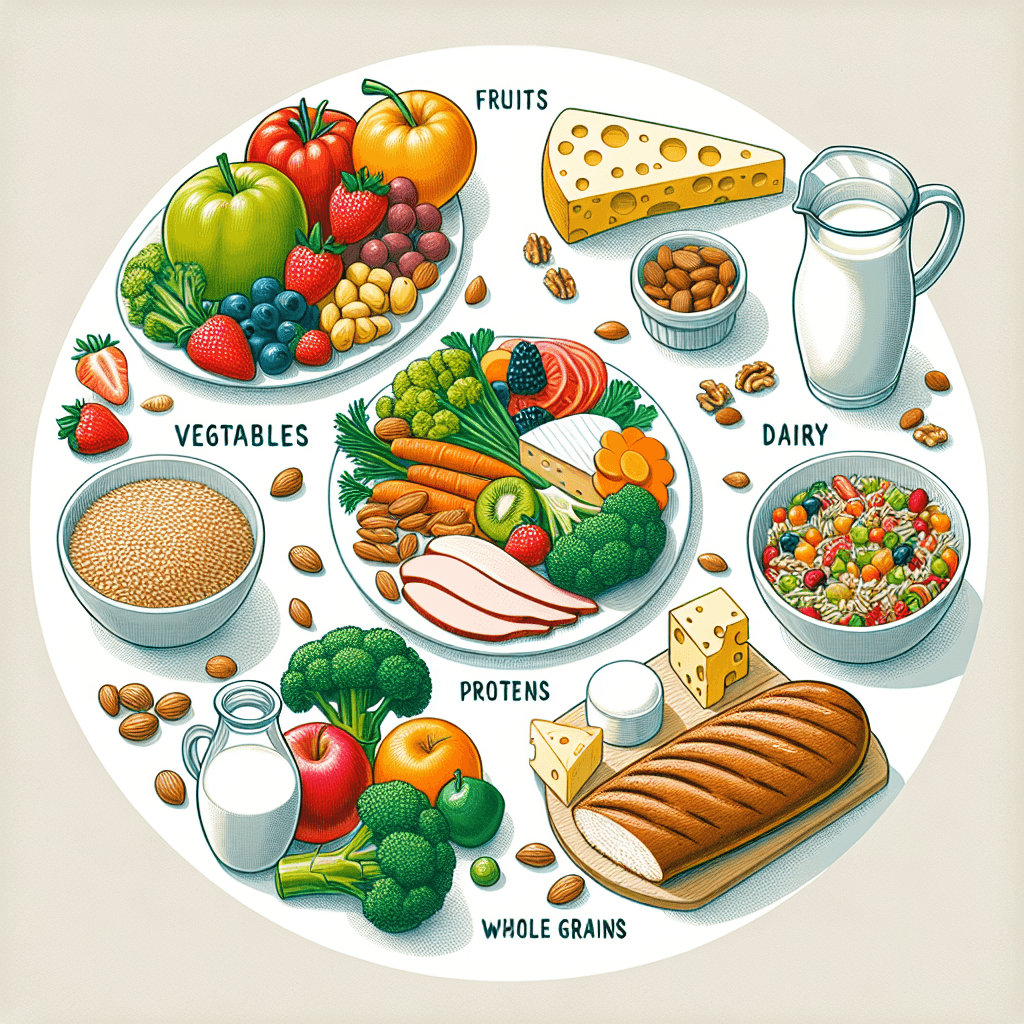Introduction
A balanced diet is essential for maintaining optimal health and well-being. It provides the body with necessary nutrients, supports growth, and helps prevent chronic diseases. This article explores various types of foods that contribute to a balanced diet.
Fruits and Vegetables
Fruits and vegetables are foundational to a balanced diet. They are rich in vitamins, minerals, and antioxidants. These nutrients support various bodily functions and help protect against illnesses. A diverse range of colors and types ensures a wide spectrum of nutrients.
- Leafy Greens: Spinach, kale, and Swiss chard are high in vitamins A, C, and K. They provide fiber and are low in calories.
- Berries: Blueberries, strawberries, and raspberries are rich in antioxidants and vitamin C. They support immune health and reduce inflammation.
- Citrus Fruits: Oranges, lemons, and grapefruits are excellent sources of vitamin C, which boosts immunity and aids in collagen production.
Whole Grains
Whole grains are an important part of a balanced diet, providing energy and essential nutrients. Unlike refined grains, whole grains retain their bran and germ, offering more fiber and nutrients.
- Brown Rice: A versatile grain that provides fiber, B vitamins, and minerals like magnesium.
- Oats: Rich in soluble fiber, oats support heart health and help maintain stable blood sugar levels.
- Quinoa: A complete protein source, quinoa contains all nine essential amino acids and is high in fiber.
Lean Proteins
Proteins are crucial for building and repairing tissues. Lean protein sources are low in saturated fats, making them healthier options.
- Poultry: Chicken and turkey are high in protein and lower in fat compared to red meats.
- Fish: Salmon, mackerel, and sardines are rich in omega-3 fatty acids, supporting heart and brain health.
- Legumes: Beans, lentils, and chickpeas are excellent plant-based protein sources, also providing fiber and iron.
Dairy and Alternatives
Dairy products provide calcium, essential for bone health. For those who are lactose intolerant or prefer plant-based options, fortified alternatives are available.
- Milk: Offers calcium and vitamin D. Opt for low-fat or fat-free versions for reduced saturated fat.
- Yogurt: Contains probiotics, which support gut health. Choose plain yogurt to avoid added sugars.
- Almond Milk: A popular plant-based option, often fortified with calcium and vitamin D.
Healthy Fats
Healthy fats are vital for brain function and hormone production. They also help absorb fat-soluble vitamins.
- Avocados: Rich in monounsaturated fats, avocados support heart health and provide potassium.
- Nuts and Seeds: Almonds, walnuts, flaxseeds, and chia seeds offer healthy fats, protein, and fiber.
- Olive Oil: A source of monounsaturated fats and antioxidants, beneficial for heart health.
Hydration
While not a food, proper hydration is a key component of a balanced diet. Water supports digestion, nutrient absorption, and temperature regulation.
- Water: Essential for all bodily functions. Encourage regular consumption throughout the day.
- Herbal Teas: Offer hydration along with potential health benefits, depending on the herbs used.
Balanced Meal Planning
Creating balanced meals involves combining these food groups to meet nutritional needs. Aim for half the plate to be fruits and vegetables, a quarter for whole grains, and a quarter for proteins. Incorporate healthy fats in moderation and ensure adequate hydration.
Breakfast Ideas
- Oatmeal with Berries and Almonds: Provides fiber, antioxidants, and healthy fats.
- Whole Grain Toast with Avocado and Poached Egg: Combines whole grains, healthy fats, and protein.
Lunch Ideas
- Quinoa Salad with Mixed Vegetables and Grilled Chicken: Offers protein, fiber, and vitamins.
- Vegetable Soup with Lentils and Whole Grain Bread: A hearty option rich in nutrients and fiber.
Dinner Ideas
- Grilled Salmon with Steamed Broccoli and Brown Rice: Provides omega-3s, vitamins, and minerals.
- Stir-fried Tofu with Mixed Vegetables and Quinoa: A plant-based meal with complete protein and fiber.
Conclusion
A balanced diet includes a variety of foods from all food groups. By incorporating fruits, vegetables, whole grains, lean proteins, and healthy fats, individuals can support their health and well-being. Planning meals with these components ensures a diverse and nutrient-rich diet.

